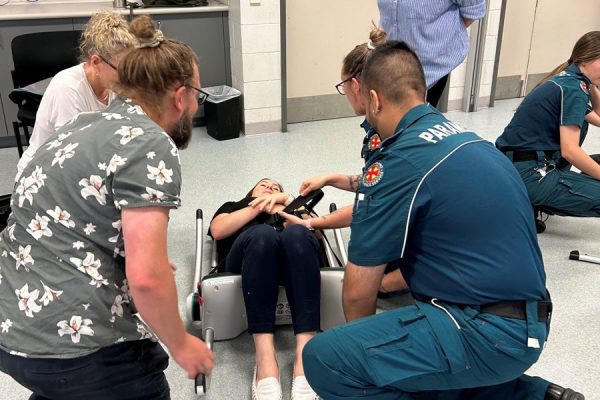Collaborative falls program pilot benefits Metro North communities

: A collaborative falls response program being piloted in Brisbane’s Metro North (MN) and Metro South (MS) communities is having some amazing outcomes for elderly patients who have fallen.
A collaborative falls response program being piloted in Brisbane’s Metro North and Metro South communities is showing truly ‘uplifting’ results so far.
The Queensland Ambulance Service’s (QAS) Falls Co-Response Program is being trialled for patients who have fallen with minor or no obvious injuries, to ensure they are responded to and assessed sooner, with referrals to alternative treatment pathways offered to help them stay in their homes independently for longer.
QAS Falls Co-Response Program Manager Kym Murphy said the program partners paramedics with Metro North Health’s Community and Oral Health occupational therapists and physiotherapists, harnessing their skills, knowledge, and capabilities to assess not only a patients’ health and injuries after a fall, but also their environment to prevent future falls.
“According to QAS’s state-wide statistics during the 2020 and 2021 calendar years, falls were the most common call for service of all Triple Zero (000) calls,” Kym said.
“Our research also found uninjured or minorly injured falls patients were waiting for longer to be checked over and got back on their feet.
“We know the longer people remain on the floor, the greater the risk they have of succumbing to other health emergencies, so this pilot also aims to get to them sooner.”
From the pilot’s start in October last year until 2 March this year, the QAS Falls Co-Response Program has responded to 823 patients who have had a fall.
Of these, 49 per cent of patients were provided with appropriate, individually tailored care plans and referrals without needing transport to hospital after being assessed by the specialist falls crew.
Kym said on average, the QAS Falls Co-Response crews take 43 minutes to arrive (compared to 58 minutes for standard acute teams) and the average time spent assessing the patients not taken to hospital was 82 minutes.
“QAS research found many falls patients were being transported to hospital simply to ensure they were in a safer environment which better matched their needs, but this wasn’t necessarily where they wanted to be,” Kym said.
“So this pilot program has crews where paramedics assess our patients for injuries with OTs (occupational therapists) and physios assessing their living environment to look at making some minor tweaks like moving furniture or trip hazards, or introducing some extra supports around them to keep them safe and maintain their independence.
“The true value of this service lies in the collective knowledge and skills of our paramedics, occupational therapists, and physiotherapists.”
Currently the QAS has two Falls Co-Response Program crews operating across the Metro North and Metro South Health regions daily.
Kym said the Falls Co-Response Program pilot team’s current priorities were focused on embedding sustainable processes for the crews and improving the program when opportunities are identified.
